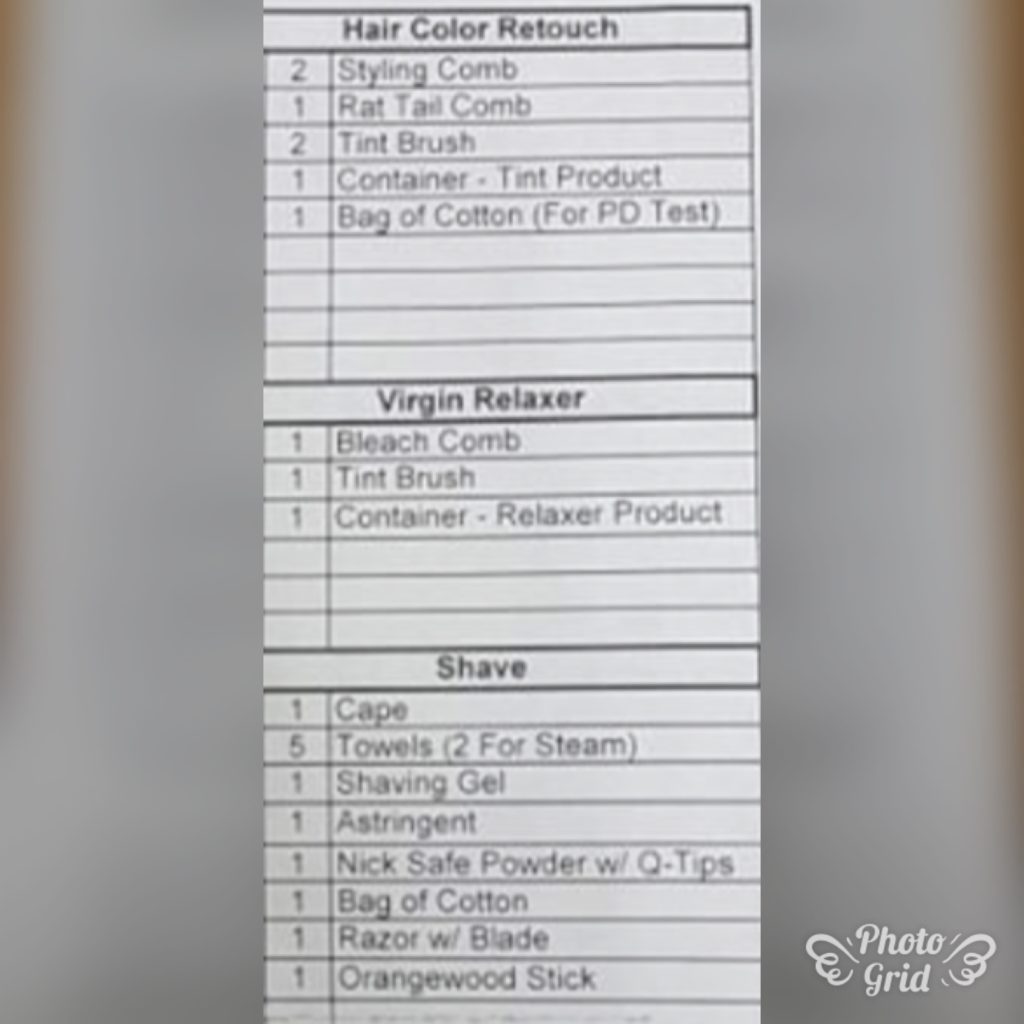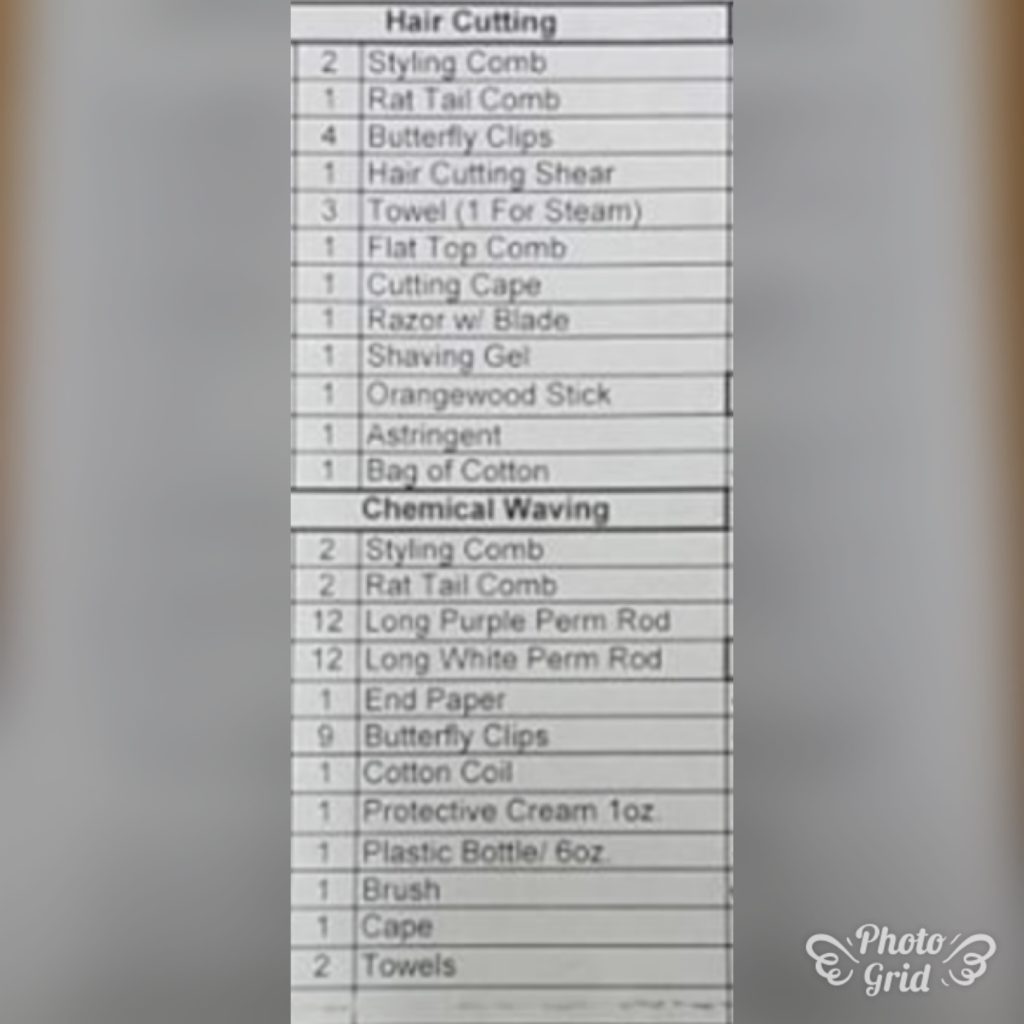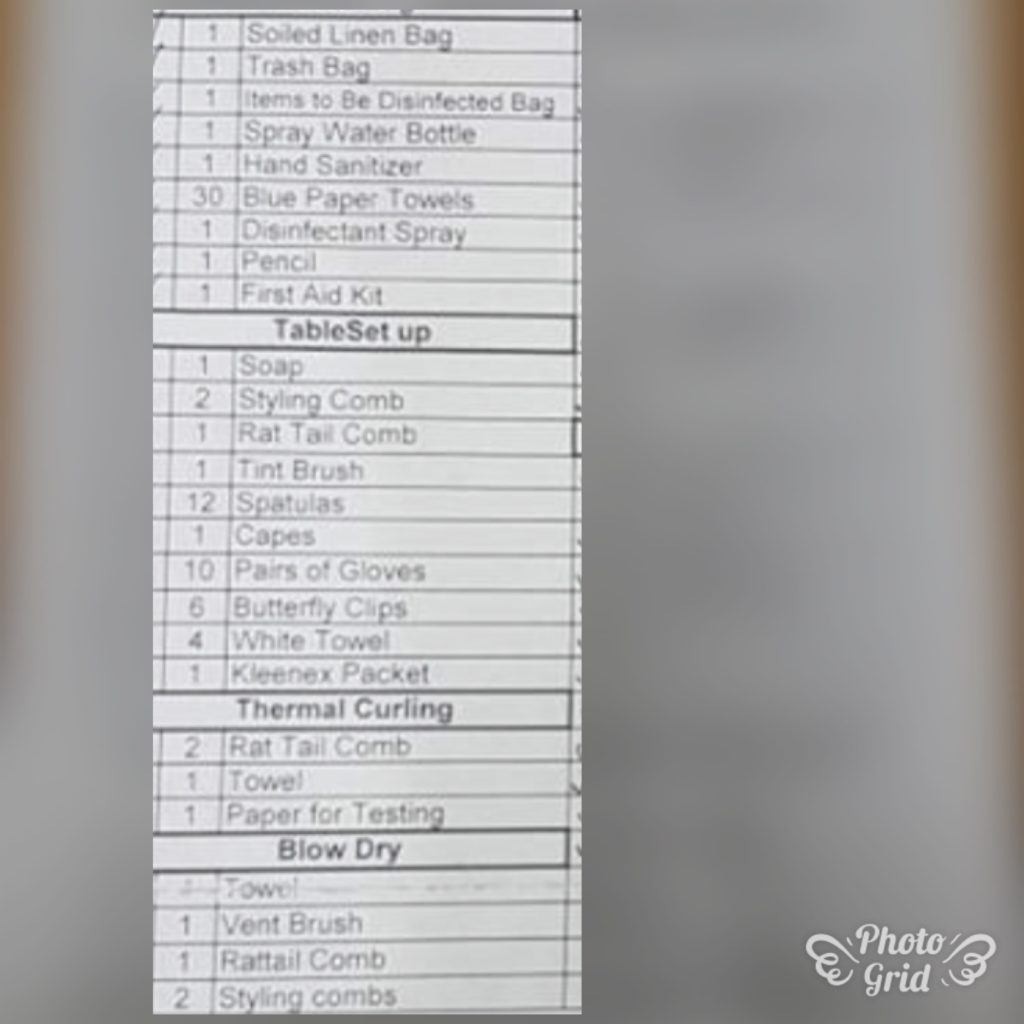The Barber Boot Camp
Tools list for the practical examination
To assist you in being successful on test day the following tools and materials are recommended. Please note that this is just a general list of items you may need to have. Since each state is different please check on your states website for a more specific list.
Review your state’s practical exam guidelines before you show up on test day. Many state exams require that your clean tools and accessories be in a container marked “clean,” and also require that you bring storage containers marked, “Soiled,Trash, To be sanitized, To be laundered” in which you place your soiled materials after performing an examination procedure.
General state licensing exam tools for barbering:
Necessary supplies:
Chemical wave rods and end papers
Perm lotion
Additional general supplies:
Mannequin head with table clamp
Disinfectant that is certified to eliminate bacteria, viruses, and fungi
Protective cotton
Protective cream
Multiple combs, including a clipper comb, cutting combs, and combs with metal tails
Multiple clips butterfly and skinny clips
Reminder: For safety reasons, most states require you to wear closed-toe, closed-heel shoes that cover the top of the foot and are made of material that is not easily pierced (please note that material such as canvas is unacceptable).
Materials list according to procedures
Please note some procedures may not be listed here so please reference your state board examination protocol for exact list
PREPARATION OF WORK AREA:
☐EPA-approved surface sanitizing solution in original, labeled packaging (may be liquid, spray, wipes, etc.) ☐Disposable towels or cloth towel (to wipe surface dry)
☐Glass cleaner – optional (for cleaning mirror at station)
☐Plastic bag(s) for disposables/trash☐Tape to secure trash bag to work area
CLIENT (MANNEQUIN) PREPARATION:
* IMPORTANT: If your model does not meet the requirements as set forth, you will be automatically dismissed. Please note that longer hair or excessive hair growth beyond the required 2” minimum is discouraged as examinees may encounter difficulty with the haircut.
☐Live Model/Person – MUST be at least 17 years of age in most states, have a full head of hair (minimum of 2” long), and 2- 3 days facial growth to perform required proceduresNOTE: Entire face of model must be shaved in most states at the practical exam; it is permissible, however, to exclude the mustache.
☐Hair cutting cape and/or shampoo cape (barber clip to secure cape – optional)
☐Neck strips and/or towel (15” x 25/26”)
GENERAL SUPPLIES FOR SET-UP:
Note: The use of hot towel caddies will NOT be allowed at the exam.☐Spray water bottle (pre-filled), clearly labeled (or you may bring a water bottle to fill the spray bottle with at the exam)
☐Hand sanitizer (in original bottle/dispenser or packet)
☐Alcohol wipes or spray-on implement sanitizer in original packaging (for exam purposes: to be used in case of scissor/razor contamination)☐Plastic, rigid (hard) container (large enough to accommodate shears/scissors and razor) and a sealable plastic bag (in case of blood spill), labeled ‘blood contamination’
☐First Aid Kit: Adhesive bandages (2-3), disposable protective gloves, and styptic powder or liquid in sealable plastic bag labeled ‘First Aid’ (may be placed inside of rigid container)☐Spatulas (for removing product from containers as necessary) – [Note: If portions are in containers intended for one-time use and are disposed of, spatulas will not be required.]
If you do not choose to transport clean implements solely in sealable plastic bags, you will also need:
☐Covered container labeled ‘clean’ for transporting implements (shears/scissors, blades, combs, detachable clipper blades, etc.)☐Covered container labeled ‘dirty’ for transporting used implements from exam (shears/scissors, blades, detachable clipper blades, etc.)
Haircutting Techniques
Note: The use of outliner/edgers are NOT allowable on some states examination. Check your local barbering board and make sure.
☐Cutting shears/scissors (two pairs will be necessary if freehand clipper cutting will be demonstrated on coarse hair types)
☐Blending/thinning shears – optional (Note: Shears used with freehand are not suitable for demonstrating the arching technique)
☐Cutting comb, all-purpose comb, or tail comb (a hair pick may also be used for coarser hair textures)
☐Sectioning clips (may be used for models with longer hair) – optional
☐Changeable blade straight razor
☐Razor blades (extra blades optional)
☐Clippers with guard/comb attachment
☐Blade(s) – #1 or lower required
☐EPA-approved spray disinfectant
☐3-4 towels (15” x 25/26”) and/or disposable towels
☐Shaving cream
☐Talcum powder
☐Neck strips – optional
Shampooing Techniques
☐3-4 clean terry towels (15” x 25/26”)
☐Shampoo cape
☐Shampoo (in container labeled with product type and name)
Shaving – Facial Hair
☐Minimum of 2-3 clean terry towels (15” x 25/26”) – required for steaming
☐4 additional towels (15” x 25/26”) – choice of material/weave (may be terry or another suitable towel of specified dimension)☐Changeable blade straight razor
☐2-3 disposable blades (long or short blades are acceptable) ☐Lather/shaving cream
☐Disposable professional service towels – optional
☐Beard softener/pre-shave conditioner oil – optional
Facial Massage
☐4 or more clean terry towels (15” 25/26”) required for steaming
☐3 additional towels (15” x 25/26”) choice of material weave (may be terry or other suitable towel of specified dimension)
☐Massage cream (in container, labeled with product type and name)
☐Cleansing cream (in container labeled with product type and name)
☐Talcum powder
☐Disposable professional service towels – optional
☐Mild astringent – optional
Clean Up of Work Area
☐‘Sharps’ box/container or other plastic, rigid (hard) container suitable for transporting used razor blades (no plastic beverage bottles)
☐Mini broom and dust pan – optional
*Please note that towel requirement can vary state to state.
*Please note that some states require a demonstration of chemical straightening or curling check with your administrating state board to verify what procedures you’ll be tested on.


